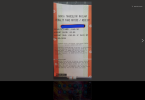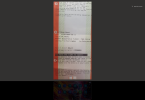Ok so as mentioned 2nd appeal, this for a rail fine.....I'll be as brief but detailed as possible.
After returning from Heathrow to Farringdon, my next leg intended was Kings cross to Peterborough. However on getting to Farringdon station from the Elizabeth line I was really not sure which platform to take. Standing on the circle line side (in no mans land ) of the station road side of the gates, I ask a female fair gate guard which platform do I need for Kings cross .
She ask where I was going , I showed her my online ticket booked through the trainline.com , after looking at the phone with said ticket and seeing I was heading to Peterborough.
I was told you don't need to go to Kings cross, you can travel from platform 4 next train to Peterborough on the opposite side (Elizabeth line) on this ticket.
Fast forward to St Neots and ticket guard boards asking me for ticket, and sure enough I have an invalid ticket to travel. 140£ fine.
I guess my question is if a member of public is unsure as to where they are going or should be, is it not the job of staff representing the rail services to give correct advise?.
I would say there are so many people who can physically travel but may well be unsure as to the layout of a station, unsure how to read service boards, maybe with dyslexia, learning difficulties etc ...
That as a result may want to speak to a member of staff, is it unreasonable to assume a staff member manning the fair gates should and would give correct information. Even to say have a duty to make sure that information was correct. Otherwise what would be the point of giving information.
What is annoying me is I intended to travel via Kings cross and would have done just that if giving the platform number. But having then been told confidently I don't need to do this, what would anyone do in such a situation. This now after hindsight is obviously a question I know better of. But there is a first time for everything in life.
Is it my mistake for believing in her and what she was telling me, or the person giving in the information??
How do I go about stating this contravention, as they have charged me with?
Help would be most appreciated.
Cheers.
After returning from Heathrow to Farringdon, my next leg intended was Kings cross to Peterborough. However on getting to Farringdon station from the Elizabeth line I was really not sure which platform to take. Standing on the circle line side (in no mans land ) of the station road side of the gates, I ask a female fair gate guard which platform do I need for Kings cross .
She ask where I was going , I showed her my online ticket booked through the trainline.com , after looking at the phone with said ticket and seeing I was heading to Peterborough.
I was told you don't need to go to Kings cross, you can travel from platform 4 next train to Peterborough on the opposite side (Elizabeth line) on this ticket.
Fast forward to St Neots and ticket guard boards asking me for ticket, and sure enough I have an invalid ticket to travel. 140£ fine.
I guess my question is if a member of public is unsure as to where they are going or should be, is it not the job of staff representing the rail services to give correct advise?.
I would say there are so many people who can physically travel but may well be unsure as to the layout of a station, unsure how to read service boards, maybe with dyslexia, learning difficulties etc ...
That as a result may want to speak to a member of staff, is it unreasonable to assume a staff member manning the fair gates should and would give correct information. Even to say have a duty to make sure that information was correct. Otherwise what would be the point of giving information.
What is annoying me is I intended to travel via Kings cross and would have done just that if giving the platform number. But having then been told confidently I don't need to do this, what would anyone do in such a situation. This now after hindsight is obviously a question I know better of. But there is a first time for everything in life.
Is it my mistake for believing in her and what she was telling me, or the person giving in the information??
How do I go about stating this contravention, as they have charged me with?
Help would be most appreciated.
Cheers.






